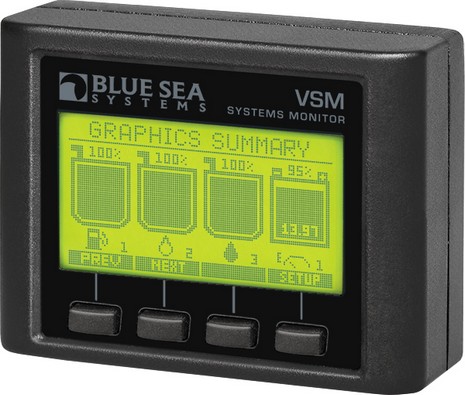Category: Electrical & Engines
Bert van den Berg, proprietor of Cruz Pro, writes that “Once every few weeks or so we get an instrument back or get a call from someone who says one of our instruments is acting erratically. Almost invariably it ends up that the customer (or worse, their electrical installer) has done something dumb and wired it so that the instrument is susceptible to voltage transients. For this reason I have written an article to help show how electronic installers would wire electronics into a boat as opposed to how many electrical installers wire electronics into a boat…Please have a look and let me know what you think.”
Something I was very pleased to find on the ever more likely future Gizmo is extensive documentation on its DC and AC wiring…
Like so many CruzPro instruments, the CS-60 fits a 54mm hole, comes round or square, and has a three-button interface (with a surprisingly deep menu structure behind it). But what’s a “Clocked Switch”? Actually that “gauge” contains four solid state switches each capable of handling a load up to four amps and each programmable to its internal clock in two ways…
Zounds! When we last checked in on Steve Roberts, he was installing a Simrad AP20 with a rudimentary NMEA 2000 network, and waiting on a Furuno NN3D MFD12. It was pretty standard stuff for a guy who’s into “geek expressionism, gonzo engineering, gizmological expeditions, and applied technomadics.” Well, check out Steve’s current vision of the network that will eventually reside on his 44-foot steel pilothouse cutter Nomadness…
Lest you think I’m just about big diesels, check out the good Annie G.’s auxiliary propulsion power system. Years ago I bought the cheapest Minnkoda electric trolling motor I could find (visible on Annie here) and moved the control switch to that battery box where the ‘custom’ wooden shift/throttle gives me five speeds in forward and three in reverse. None exactly makes the 18′ iron-keeled sloop jump, but the rig is handy for getting into the Camden Inner Harbor slip I often use. But I always had a problem knowing if I had enough charge to use the motor as needed. That was neatly solved last summer with the addition of that solar panel and most especially the Argus Analyzer Battery Bug…
I think I got this diagram right, and I think it’s important to understand if your boat might end up with more than a few NMEA 2000 powered devices on its network…
Sigh, that’s my first NMEA 2000 network, circa Spring 2005, when there wasn’t much more than Maretron to hang on it, and not many boaters were interested anyway. Now many N2K devices have joined these on the lab’s snaking backbone (and there are many others I’d like to try), N2K is an active topic on Panbo forums and elsewhere, and the network for my maybe-new Gizmo boat is going to be a serious undertaking. The Standard has come a long way, and methinks it’s time to reveal a little drama that went down along the way. Yes, those gray Micro cables and the yellow powertap did incur drama, even soap opera…
If graphing, say, wind speed or depth data on a little Garmin GMI 10 is useful — which it is — how about visualizing every desired vessel sensor trend on a big monitor? Krill Systems has been showing off demo screens like the one captured above and intends to include the feature in a coming update of its SoftDisplay. And Krill has kept past promises…
While these screenshots (click’em for full size) are spectacular examples of what Maretron’s new system monitors can do, they are also a bit deceptive. That’s because the underlying sensor technology can scale to much more modest yachts, which don’t need a PC monitoring program like N2KView to use it…

OK, it’s not NMEA 2000, not color, and not touchscreen—kinda homely really—but I’m liking the new Blue Sea DC/AC/tank/bilge monitor…










